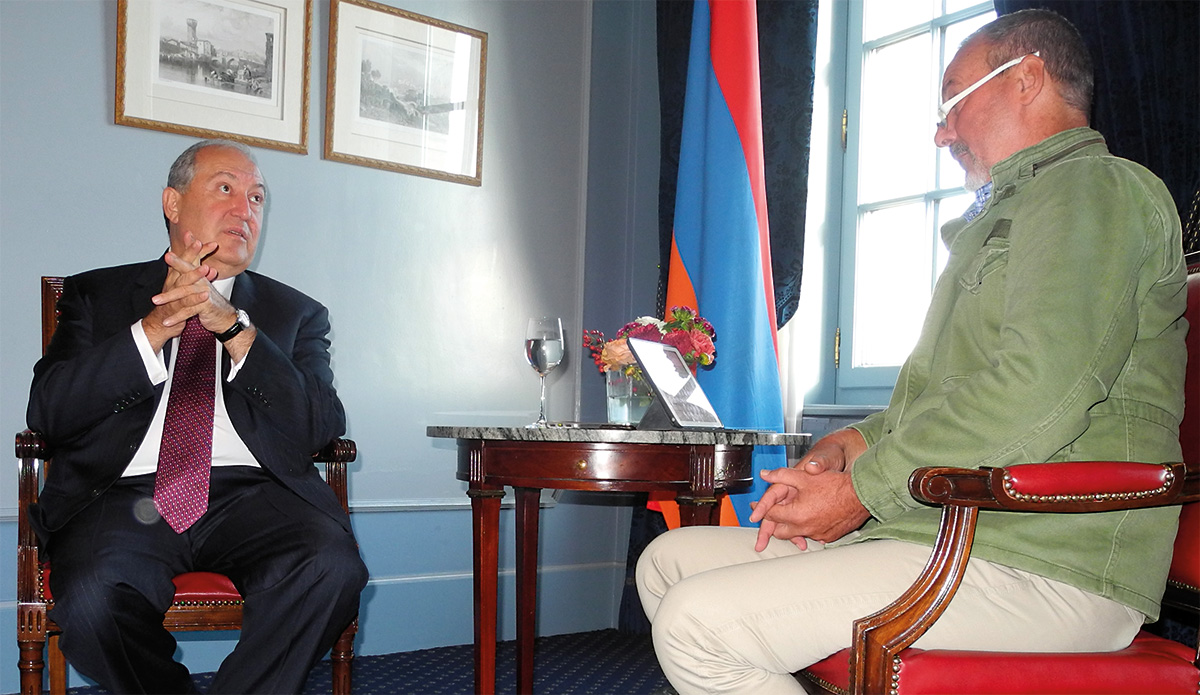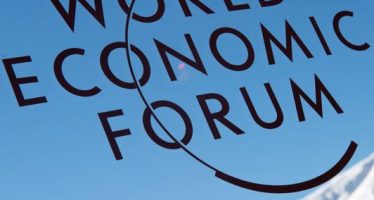President Armen Sarkissian: Quantum Politics Defined, Explained, and Considered

President Armen Sarkissian (left)
Armenia is ready for its time in the spotlight.
The landlocked country experienced a watershed moment earlier this year when journalist-turned-politician Nikol Pashinyan, 43, set out on a protest march opposing the long rule of Serzh Sargsyan, who served two consecutive five-year terms as president and clung to power by being elected prime minister (despite his promises to step down and retire from public life). The move, described as a power-grab by the opposition, reignited the protests, which rocked the country during Sargsyan’s reign.
Setting out from Gyumri, the country’s second city, Pashinyan walked almost alone. But by the time he reached Yerevan, on April 13, he had walked for 14 days. Social media had been set alight and thousands had joined the protest, marching peacefully on the capital, and believing change was about to take place. It was – but not before the besieged government had its last gasp. Leading the protesters – occupying squares, blocking traffic, and calling for civil disobedience throughout the city – Pashinyan marched on parliament to prevent Sargsyan’s appointment as prime minister. An appeal to Sargsyan to discuss the terms of his resignation and a peaceful transfer of power resulted in Pashinyan’s arrest. There was public outrage – and the next day Pashinyan was released. A few hours later, the embattled prime minister resigned. It would take another 10 days of protests and political wrangling to convince the ruling party that the change was definitive. On May 8, parliament caved-in and Pashinyan was declared prime minister, completing Armenia’s Velvet Revolution, during which no shot was fired, and no life lost.
One of the few calm voices heard during the weeks of political upheaval was that of President Armen Sarkissian, who ventured out into the crowds to hear grievances. “That was my job as president, to ensure the stability of the state and create a national dialogue,” he said.
The Power of Velvet
Meeting with CFI.co in Geneva, President Armen Sarkissian explained the issues that powered the Velvet Revolution. “One of the drivers of this revolution was that people were not happy, because of widespread corruption,” he said. “The courts were not working properly, and that created an unhealthy environment. The younger generation was especially affected, because if you have that kind of environment, it may look a bit stable, but is not just.”
“In Armenia during the revolution you didn’t need an organisation to mobilise protesters, and close off a street or avenue. The only thing you needed was a smartphone with Facebook.”
The president agrees with the protesters’ demands. “What we need in Armenia is law and order and as little corruption as possible,” he said. “We need stability. We also need a proper understanding of economic development and a plan to attain our goals, starting with tax law and including all other areas of relevance. We need proper governance, as simple as possible, with less bureaucracy and more predictability. “Anybody in the country should know that it is not only stable today, but stable tomorrow and beyond; that there is no corruption and things are working well and managed well. People and businesses should be confident that in five- or 10-years’ time, the country is still predictable and that everybody will know where Armenia is heading and with what sort of a legal system, what sort of tax code (we will have). Only this will create an environment that encourages people to invest in their future. So, this is what the government has to accomplish. It is my role as president to lead with the word, the vision, and the strategic direction.”
Sarkissian readily admits that his nation has some way to go before it finds that stability: “Armenia is in transition. I would not say that we are in a very stable situation, but I will say that the general mood towards the future of the country is much more optimistic. “In fact, very optimistic – and so much so that we have to work hard to avoid disappointment. Expectations are running high among Armenians in the country and the millions of Armenians throughout the world, who are closely following events in their ancestral home. “However, one thing is clear: there is no way back. There is no way that we are going to repeat the mistakes we made before.”
Quantum Politics
President Armen Sarkissian is, without doubt, one of the most interesting of the world’s heads-of state. A respected theoretical physicist and co-inventor of the Wordtris game, a twin to Tetris, Sarkissian could not possibly be further distanced, intellectually or politically, from his US counterpart. But he grasps better than most the various personal traits that make Donald Trump not just unique, but a harbinger of politics 2.0–or as the Armenian president prefers to call it, “quantum politics”.
Sarkissian is not one to join the global chorus that derides Trump’s style of politics. “Many world leaders, accidentally or otherwise, have grasped and applied the very essence of quantum politics,“ he said. Thanks to the advent of instant communication and the social media that leverage its power, politics has changed forever, and is no longer a linear pursuit. New leaders of the “quantum era” understand that.
“Political parties, institutions, and processes underpinned by logic have been replaced by popular movements that coalesce and dissipate quickly – and by beliefs not necessarily grounded in reason. “Social media provide the emotional connectivity that can spark revolutions.” According to Sarkissian, a reassessment of modern politics guided by the principles of quantum physics can make sense out of trends that baffle and undermine the establishment. “Just as the classic post-Newtonian world was predictable, so was politics, until quite recently. Contrast this to what we know about the quantum world – which is uncertain, yet interconnected, and changes depending on the vantage point of the observer.”
Sarkissian sees parallels in politics, where the understanding of events is fluid and largely determined by who is observing what, and where. “Newsfeeds on Facebook, Google, and other platforms have become highly individualised, and thus serve up an array of different takes on any given event. Thus, the act of observing changes reality.
“Some leaders intuitively grasp this concept and bypass the established media to serve-up they own version of reality generating millions of followers on Twitter, Facebook, Instagram, etc.” When Serzh Sargsyan swapped the presidency for the prime ministerial office, an impromptu movement was formed almost instantly via social media. It operated successfully outside the realm of the country’s political establishment and was highly dispersed. Authorities could not pinpoint the epicenter of the shockwaves shaking the establishment and were unable to get a grip on events.
No Management, No Problem
The movement rallied the 10-million-strong Armenian diaspora, without really trying. “Just as in the quantum world, interconnected yet unpredictable events are sparked in seemingly random places. The entire world is becoming more and more quantum. Individual voices can have a great influence on politics. Everything is changing and is changing with the speed of light. In five years, this will be a technologically different world, even more integrated and interconnected. Some would say that processes of globalisation have slowed down. Maybe globalisation has slowed down but it has turned into microglobalisation and that process is unstoppable.” Sarkissian admits that quantum politics still lacks the necessary management framework or protocol. This need not be a problem. Sarkissian posits that quantum politics is about the power of the individual on the street. “It channels the activity or the energy that individuals can contribute towards change,” he said. “It is also more about smaller units that possess huge energy, and can cause a big effect. “As a former physicist, I have the right to look at this as a quantum, not in a sense that I can directly apply the theory of quantum mechanics to human society, but as a method of thinking and logic, or a method of mathematics to predict what can happen in a human society. One thing is certain: political institutions, and established societal organisations, are becoming a bit less relevant as social networks, individual opinions, and strong ideas create an impact that continues to grow in size.
“For example, in Armenia during the revolution you didn’t need an organisation to mobilise protesters, and close off a street or avenue. The only thing you needed was a smartphone with Facebook. Just send out the word and that street would be closed in no time flat, by people you had never met before. There was no top-to bottom organisation directing events. There was no hierarchy processing and dispatching orders. Individuals took the initiative, and groups formed spontaneously.
Interestingly, this did not result in chaos, but at the end of the day, the whole stochastic system was delivering whatever was needed.”
We live in interesting times, and for Sarkissian, that need not be a bad thing: “Technology has already thrown a spanner in the works and now promises to deliver the Fourth Industrial Revolution. “All of that is not mechanical, or preordained, but will have a huge impact on the way we think, act, and manage how we are governed. However, we cannot yet see the whole picture, because it is all new and global too. The first phase of globalisation unfolded along classic lines with leaders and institutionalised structures such as investment banks pointing the way and telling us to work hard in order to join organisations such as the WTO.
“Being part of a globalising world actually implies hard work. But look what is happening today: young people don’t want to work at an investment bank, but at an exciting start-up –with the hope that they become the next internet billionaires by creating something as disruptive and revolutionary as Facebook or Google. Others want to be a part of the movement towards sustainability and work for a cleaner world.”
The Trouble with Planning
Sarkissian says governments need to adjust and stop planning things. “Could I imagine, living in the Soviet Union as a scientist and professor of theoretical physics, that one day this almighty superpower would collapse? It looked impossible.
“The strength of the Communist Party, the KGB and everything… well, it would take a hundred years or so. And then it was over, just like that. Then could I imagine that my country would become independent? Could I imagine that I would be given the privilege of serving my country, first as a diplomat and prime minister, and then a president?
“No, I most certainly could not. Today, we are standing at the crossroad of the history of civilizations. It’s a crossroad where the old paradigms, old ways of looking at human society, or classical ways of handling global risks are not effective enough. This is a new era, the era of quantum risks, quantum security and quantum politics.”
In interesting times, amazing thing can and will happen. Just so is with Armenia. The revolution changed all that ushering in a new age that brings hope as well as a renewed sense of purpose.
Armenia is an ancient country, and an early outpost of civilization with its capital of Yerevan, which is 2,800 years old. Much later, Armenia became the first country in the world to adopt Christianity as its official religion – in the year 301. Surviving invasions, occupations and genocide, the nation never lost its will. Independent since 1991, Armenia has shaken off its overlords to gain control of its destiny.
Armenia finds itself yet again on a crossroad. Though Sarkissian has a clear vision on how to carry his nation over the threshold of modernity, he acknowledges that in the new reality – shaped by unpredictable quantum politics – anything might happen.
But by refusing to fixate on any imagined future, he might accomplish his task by focusing on the relevant drivers. Though the result will probably look nothing like the vistas painted now, Sarkissian remains confident that the dynamics of Armenian society, now unleashed in full, will shape a tomorrow better than today.
A Stable Revolution: Armenia Takes Charge of Its Future
The Velvet Revolution which rocked Armenia softly yet decisively in the Spring of last year has not only changed the political direction of the country but also shifted its economic gears.
Though the previous government had already prepared and unveiled a comprehensive reform agenda and development programme as first steps towards securing the backing of the International Monetary Fund (IMF), the new administration of acting prime minister Nikol Pashinyan proposes a broader approach that includes a thorough redesign of political and economic structures with a view to ensuring transparency, accountability, and the rule of law.
Interestingly, the prime minister’s political movement, Yelk (Way Out), refuses to upset the constitutional order and works within the framework of parliamentary democracy to effect change. The idea is to use the system to combat its abuse.
During a conference last November in Yerevan on the Current Challenges And Strategic Direction Of Armenia’s Economic Development, the acting prime minister underlined the importance of constitutionalism. “Everyone was saying that this is a political issue and that we should talk about the economy,” he said. “We were saying that the most important thing for the economy is legitimacy, the equality of all before the law, and the formation of an environment of justice.”
Pashinyan aims for nothing less than a national consensus whereby Armenians assume role and responsibility for finding ways to address societal issues. He is adamant that government no longer controls all levers and provides all solutions. “This is what we used to have, and it is nonsense. Government cannot and should not micro-manage the economy or, indeed, our society. If it does and fails to deliver results, people will obviously blame government and want to see it gone.”
Pashinyan noted that political behavior has changed, with people previously uninterested in the running of the country suddenly discussing the nation’s future. The genie of civic engagement is out of the bottle. “The political revolution has already taken place and cannot be turned back,” he said. “We now need to change economic behavior in order to have an economic revolution.”
The first order of business has been to end government patronage of Armenia’s oligarchs. Pashinyan is adamant that their influence and power have already been curtailed. “The people are still here but their power has been taken away.” But Pashinyan is careful not to step on too many toes at once, keeping Moscow appraised of his intentions and ensuring that the revolution, and the new government that took power in its wake, are not interested in changing the precarious geopolitical balance in the Caucasus.
Armenia is also reluctant to move away from the Eurasian Union, which ties together the economies of Russia and four former Soviet republics (Belarus, Kazakhstan, Kyrgyzstan, and Armenia). Even though the country identifies culturally with Europe via its predominant religion, language, and diaspora, the acting prime minister has indicated that the government for the moment doesn’t wish to move much further than the Armenia-EU Comprehensive and Enhanced Partnership Agreement (CEPA), ratified by the parliament in Yerevan last April. The deal includes elements of a free trade agreement and removes all tariffs and quotas from a list of over 6,500 products. Though negotiated and delivered by the previous government, the partnership is expected to help the current administration by demanding the implementation of a strong legal framework that ensures the stability and predictability that businesses and investors demand.
According to Pashinyan, the moment is now. “Today, economic development is mainly associated with the development of human capital. Human and intellectual capital is our greatest value, and everything must begin from here. Our goal is to ensure our citizens’ freedom, happiness, and prosperity, and that is a political issue that we must address together.”
Investors may want to take note. Armenia is not so much in flux as laying the groundwork for a modern society geared for sustainable growth. It insists that rules are clearly spelled out, and actually followed. A nation that draws these conclusions, and acts upon them without any outside prodding is one that seems determined to pull itself up by the proverbial bootstraps.
You may have an interest in also reading…
World Bank Group: Ask Citizens Where Public Money Should Go – The Surprising Results
As citizen engagement gains traction in the development agenda, identifying the extent to which it produces tangible results is essential.
Fata Morgana in the High Alps: Musings on Davos
While currencies crumbled in emerging markets ranging from Turkey to Argentina, the world’s mostly self-appointed leaders and assorted hangers-on gathered
The Promise and Pressure of the UK’s AI Aspirations
With world-class universities, a vibrant startup ecosystem and renewed strategic investment, the United Kingdom has the intellectual capital and policy


















































































